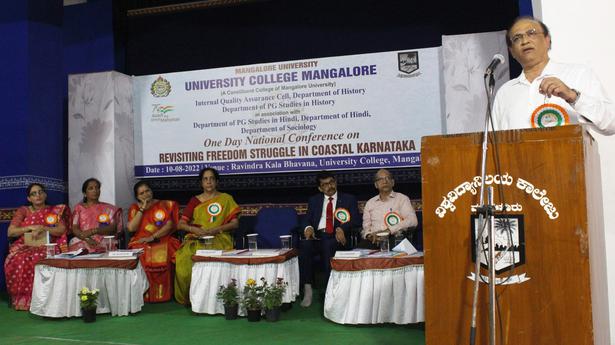
Freedom struggle in the coast was influenced by many factors, Shyam Bhat
The Hindu
MANGALURU
Various factors, including socio-religious upliftment, political knowledge, and others, influenced the freedom struggle in coastal Karnataka, said Goa University History Department head N. Shyam Bhat on Wednesday.
He was delivering the keynote address at a national seminar on ‘Revisiting Freedom Struggle in Coastal Karnataka’ organised by University College, Mangaluru, here.
Prof. Bhat said the nationalism factor along with the spread of educational institutions, printing technology, and several personalities contributed to the spread of the freedom struggle in the region. Residents had greater awareness about social, political, and economic issues in the region, he noted.
Presiding over the inauguration, Mangalore University Vice-Chancellor P. Subrahmanya Yadapadithaya said everyone has to remember the sacrifices of freedom fighters when the country was celebrating 75 years of independence. People have to work hard towards preserving the precious freedom, he said.
Prof. Yadapadithaya recalled the fight in different spectrums, including revolutionary, non-violent, literary, social reforms etc.
Mangalore University History Department head K.M. Lokesh said that along with the sacrifices for the freedom struggle, millions of soldiers who sacrificed their lives to maintain freedom should also be remembered.
Principal Anasuya Rai, seminar convener N. Jayaraj, Hindi Postgraduate Department coordinator Nagaratna N. Rao, Sociology Department head N. Gayathri, Hindi Department head R. Suma, and others were present.

Prodancy Pvt Ltd, a medtech startup specialising in surgical consumables for joint replacement surgeries, has successfully raised ₹2.14 crore in a funding round co-led by Campus Angels Network and Keiretsu Forum Chennai, which also saw participation from existing investors Center for Cellular & Molecular Platforms (C-CAMP) and other angel investors.

“Writing, in general, is a very solitary process,” says Yauvanika Chopra, Associate Director at The New India Foundation (NIF), which, earlier this year, announced the 12th edition of its NIF Book Fellowships for research and scholarship about Indian history after Independence. While authors, in general, are built for it, it can still get very lonely, says Chopra, pointing out that the fellowship’s community support is as valuable as the monetary benefits it offers. “There is a solid community of NIF fellows, trustees, language experts, jury members, all of whom are incredibly competent,” she says. “They really help make authors feel supported from manuscript to publication, so you never feel like you’re struggling through isolation.”









